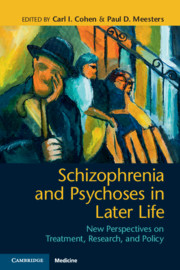Book contents
- Schizophrenia and Psychoses in Later Life
- Reviews
- Schizophrenia and Psychoses in Later Life
- Copyright page
- Contents
- Contributors
- Preface
- Acknowledgments
- Section 1 Epidemiology, Historical Background, Illness Phenomenology, and Diagnostic Issues
- Section 2 Biological, Neurocognitive, and Medical Aspects
- 5 Biological Changes in Older People with Schizophrenia
- 6 Cognitive Functioning in Older Adults with Schizophrenia
- 7 Medical Issues in Older Adults with Schizophrenia
- Section 3 Outcome and Course
- Section 4 Social Functioning and Mood
- Section 5 Treatment and Services
- Section 6 Health Policy and Research: Future Directions
- Index
- References
6 - Cognitive Functioning in Older Adults with Schizophrenia
from Section 2 - Biological, Neurocognitive, and Medical Aspects
Published online by Cambridge University Press: 15 March 2019
- Schizophrenia and Psychoses in Later Life
- Reviews
- Schizophrenia and Psychoses in Later Life
- Copyright page
- Contents
- Contributors
- Preface
- Acknowledgments
- Section 1 Epidemiology, Historical Background, Illness Phenomenology, and Diagnostic Issues
- Section 2 Biological, Neurocognitive, and Medical Aspects
- 5 Biological Changes in Older People with Schizophrenia
- 6 Cognitive Functioning in Older Adults with Schizophrenia
- 7 Medical Issues in Older Adults with Schizophrenia
- Section 3 Outcome and Course
- Section 4 Social Functioning and Mood
- Section 5 Treatment and Services
- Section 6 Health Policy and Research: Future Directions
- Index
- References
Summary
- Type
- Chapter
- Information
- Schizophrenia and Psychoses in Later LifeNew Perspectives on Treatment, Research, and Policy, pp. 69 - 78Publisher: Cambridge University PressPrint publication year: 2019



